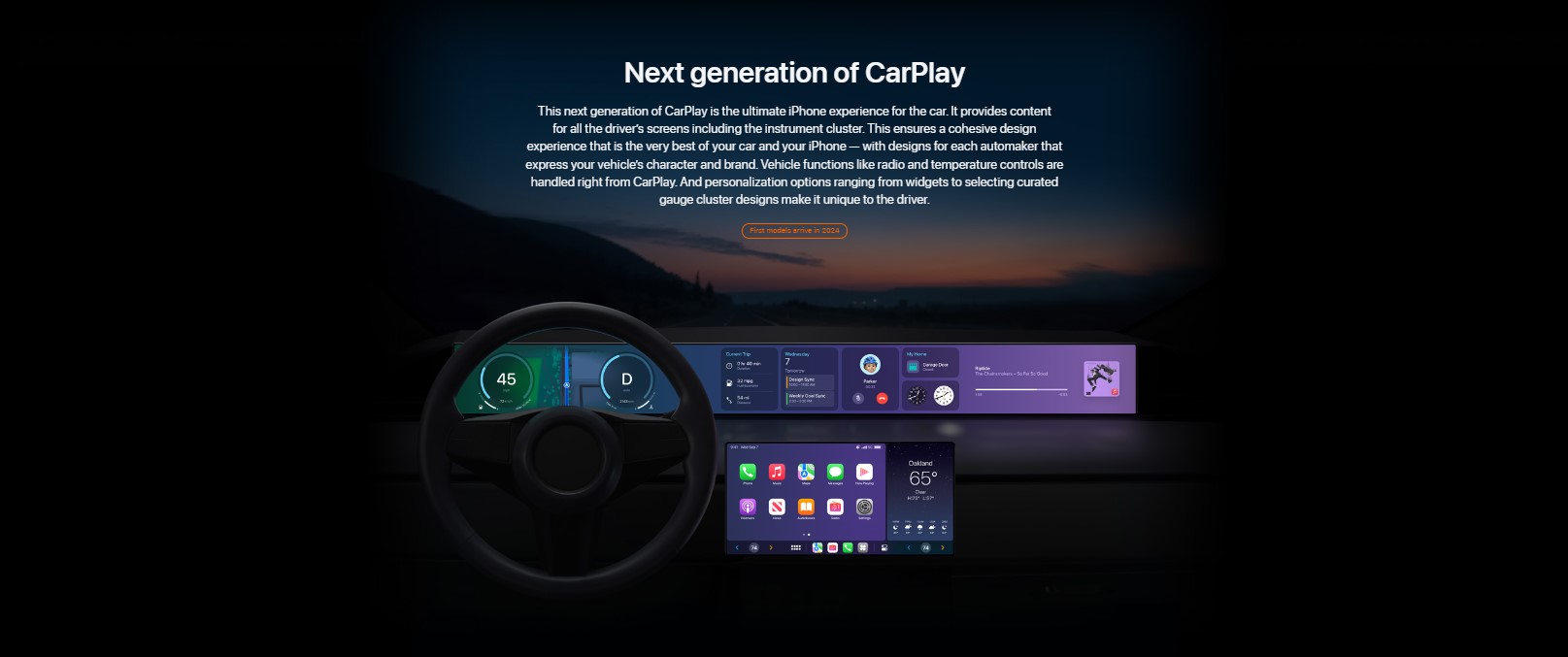After some delays, Apple CarPlay 2.0 is set to release in 2024. However, uptake might not be particularly good, and that could be all Apple’s fault. The tech giant had previously aimed for a late 2023 launch, though that now seems to have been pushed back to this year. But when it comes to CarPlay 2.0, Apple may have bigger problems than a delayed launch date to grapple with.
With 2.0, users will be able to control their car’s climate, heated seats, and radio. Other features of the new infotainment system include the ability to adjust some yet undisclosed vehicle settings, monitor things like tire pressure, and record data about the vehicle. Overall, the update seems like it is designed to integrate Apple CarPlay with the vehicle itself better and open the door to greater functionality down the line.
However, while the platform is incredibly popular, and extra features are always welcome, Apple may have made a few errors with this generation of CarPlay. As a result, the highly anticipated launch may not go as smoothly as one might expect.

Not everyone is excited about CarPlay 2.0
While we know roughly what we can expect when CarPlay 2.0 comes later this year, it’s pretty unlikely you’ll get to experience any of it. For a start, Apple hasn’t officially announced any kind of launch date, so it could be several months away at best. Unless it’s announced out of the blue, the earliest we’re likely to see a release date confirmed is at WWDC in June.
Then there’s the limited number of vehicles it’s actually going to be released on. At the time of writing, that’s Porsche and Aston Martin — both expensive cars that make up a fraction of the overall market. Especially if you only count newer vehicles that are capable of running Apple CarPlay. The likes of Ford, Nissan, BMW, Mercedes, Jaguar Land Rover, et al. have yet to announce they’re on board with the latest version.
Finally, one of the features may rub people up the wrong way. Apparently, Apple Car Play will be capable of recording things like driving data. Exactly what data and what that data will be used for is all up in the air. But if you drive a Porsche like you should probably drive a Porsche, then it’s unlikely to knock a few dollars off your annual insurance bill.

Manufacturer uptake may kill Android Auto
There may be more to most manufacturers not yet confirming CarPlay 2.0 support than meets the eye. Firstly, GM has announced plans to ditch Apple Car Play altogether, and this may be a good opportunity to do that. While not outwardly confirming their intentions, many other manufacturers may follow suit. Here at The Manual and in many other places, there’s a commonly held belief that the in-car experience is “the next frontier” for the automotive sector.
While electric cars improve performance on paper, they also mute the driving experience somewhat. The in-car experience, of which infotainment plays a major part, is a way manufacturers can compensate for this. So just as displacement, efficiency, and 0-60 times were a battleground in previous decades, the in-car experience is more than likely where major players will battle it out in the years to come.
Because of this, data may again be the sticking point. Just as drivers may not want Apple to know what they’re doing in their cars, car companies can also be protective of that data. Why would they give useful information away to Apple when, at the end of the day, Apple is a rival business? Especially when manufacturers are spending so much money developing their own systems and seemingly have an uphill battle prying customers away from CarPlay, to begin with.
Then there’s the “full dash” element of CarPlay 2.0, which is a non-starter for many of the automotive companies The Manual has spoken to. BMW, in particular, said that CarPlay 2.0, or any other third-party full dash display, is “out of scope” for it.
It also stretches beyond the upcoming infotainment war. Rumors that Apple is working on its car have been abound for years, and that’s another area where driver data could come in handy. Apple’s loyal fanbase would already give the company an advantage, and its strong history of developing good software gives its infotainment system an edge. Companies naturally don’t want to add to that if it can be avoided. Many have already put too much money and effort into their own systems to let Apple just walk in and take over without a fight.
Not every manufacturer will be insistent on pushing their own systems, but several key players have a history of doing things their own way. Some lower-end carmakers may see CarPlay as an easy shortcut, but a business that has historically pushed out its own types of leather in an attempt to give its products an edge is unlikely to hand over something as significant as infotainment to an outside entity. Apple Car Play and Android Auto are both at the pinnacle of automotive infotainment. But a lack of uptake from key manufacturers means Car Play 2.0 may be in for a difficult launch at best and may wind up a complete flop at worst.




